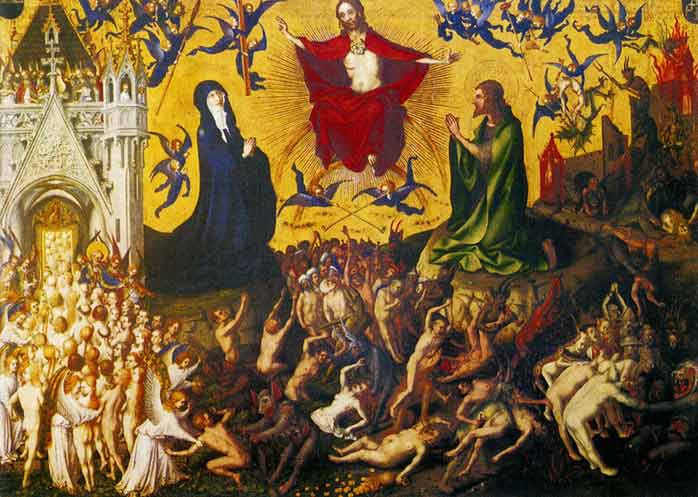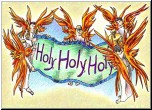Date of the Book of Revelation
The date of this book is one of the few points upon which Bible-believers
and secular historians agree: it was written late in the first century,
they concur. Early church writers who show little interest in the dating
of other books do very nearly unanimously date this one to Domitian's day.
One imaginative writer even arranges an interview between the two,
"And when all were glorifying God, and wondering at the faith of
John, Domitian said to him: I have put forth a decree of the senate,
that all such persons should be summarily dealt with, without trial;
but since I find from thee that they are innocent, and that their
religion is rather beneficial, I banish thee to an island, that I
may not seem myself to do away with my own decrees. . .And
straightway John sailed to Patmos, where also he was deemed worthy
to see the revelation of the end. (Acts of John the Theologian,
ECF_0_08 p. 1161). But this author is entangling his feet in his own
net; when Domitian first meets John, he asks him, "And the fame of
the teaching of John was spread abroad in Rome; and it came to the
ears of Domitian that there was a certain Hebrew in Ephesus, John by
name, who spread a report about the seat of empire of the Romans,
saying that it would quickly be rooted out, and that the kingdom of
the Romans would be given over to another." (Acts of John the
Theologian, ECF_0_08 p. 1161). To what is this in reference, with its
implied threat against Rome, if not to Revelation? What's more, why are the
Jews, in the wake of the War, representing themselves as Roman
patriots and complaining of the Christians?
An exception is Epiphanius, who thinks John was released from Patmos under
Claudius: ". . .after his return from Patmos under Claudius Caesar.
. ." (Epiphanius, Panarion, Section IV, Chapter 31 (51), 12.1); "He
foretold it prophetically by the mouth of St. John, who prophesied before
his falling asleep, during the time of Claudius Caesar and earlier, when
he was on the isle of Patmos." (Epiphanius, Panarion, Section IV,
Chapter 31 (51), 33.9). . .perhaps imprisoned under Gaius? Evidently the
date of this book is significant in a way that the dating of other New
Testament documents is not. Do these early authors protest too much? Only
for the weightiest reasons should one discount the testimony of those in
a chronological position to find out the facts. But in this case, the book's
internal testimony points in another direction:
"There are also seven kings. Five have fallen, one is, and the other
has not yet come. And when he comes, he must continue a short time."
(Revelation 17:10).
Some of the events described in Revelation, like the resurrection of the
dead and the second coming, are events of distant futurity to the author.
But it seems doubtful the author would isolate a slice of distant futurity
wherein one king now "is" and five kings "have fallen."
The five kings who had fallen by the author's day would have included Julius
through Claudius:
| 1 |
Julius Caesar |
| 2 |
Augustus |
| 3 |
Tiberius |
| 4 |
Gaius (Caligula) |
| 5 |
Claudius |
| 6 |
Nero Caesar |
Classical enumerations of the Caesars begin the sequence with Julius. Suetonius begins his history, 'Twelve Caesars,' with Julius. The Jewish Sibyls likewise start their count with Julius: "...there will be the first prince who will sum up twice ten with his initial letter [Caesar]. He will conquer long in wars. He will have his first letter of ten [Julius], so that after him will reign whoever obtained as initial the first of the alphabet. [Augustus]"
(The Sibylline Oracles, Book 5, 12-15). The apocryphal book known as 2 Esdras counts twelve kings: "The days are coming when the earth will be under an empire more terrible than any before. It will be ruled by twelve kings, one after another. The second to come to the throne will have the longest reign of all the twelve."
(2 Esdras 12:13-16). Augustus, the second emperor counting from Julius as first, died in 14 A.D. at the age of 76. Recalling the battle of Actium was in 31 B.C., this is the longest reign.
Josephus starts his count with Julius: "After him came Annius
Rufus, under whom died Caesar, the second emperor of the Romans, the
duration of whose reign was fifty-seven years, besides six months
and two days (of which time Antonius ruled together with him
fourteen years; but the duration of his life was seventy-seven
years); upon whose death Tiberius Nero, his wife Julia’s son,
succeeded. He was now the third emperor; and he sent
Valerius Gratus to be procurator of Judea. . ." (Josephus,
Antiquities of the Jews, Book XVIII, Chapter 2, Section 2).
Christian historian Eusebius lists Julius Caesar among the
emperors, in his enumeration of Olympiads: "183rd [Olympiad] - Theodorus of Messene, stadion race. Julius Caesar was emperor of the
Romans. 184th. - Theodorus for a second time. Augustus became
emperor of the Romans." (Eusebius of Caesaria, Chronicon, Kindle
location 1304). Julius Caesar counts as an emperor, he is not something
else, and so Augustus was not the first Roman emperor by the count of
those who lived in the ancient world. That would be Julius: "After these
remarks, we will return to the reign of the first emperor. From the
death of Tarquinius up until the time of Julius Caesar, there was an
intervening period of 115 Olympiads, which is the equivalent of 460
years." (Eusebius of Caesaria, Chronicon, Kindle location 1813).
Early Christian authors respect the customary numbering: that Julius is
the "first:"
"The annual magistrates ruled the Romans, as we say, for 453 years.
Afterwards those who are called emperors began in this order: first, Caius Julius, who reigned 3 years 4 months 6 days; then Augustus, 56
years 4 months 1 day; Tiberius, 22 years; then another Caius, 3 years 8
months 7 days; Claudius, 23 years 8 months 24 days; Nero, 13 years 6 months
28 days;..." (Theophilus of Antioch, To Autolycus, Book 3, Chapter 27).
Eusebius, already mentioned, compiled a chronology of the world,
in which Julius Caesar 'counts' as an emperor: "In her [Cleopatra's] reign, Gaius Julius Caesar became the first
Roman emperor. The next emperor, Octavius Caesar Augustus, called
Sebastos in Greek, killed Cleopatra and put an end to the dynasty of
the Ptolemaei, who had ruled for 295 years." (Eusebius of Caesarea, Chronicon, Kindle location 1055). The later emperors styled themselves 'Caesars' after the first in the series.
If his power grab was not legitimate, neither was theirs. That would make
the one who "is" Nero Caesar, who ruled from 54 A.D. to 68 A.D.
Thus the internal testimony of the book. Additional circumstantial evidence
turns up in the Great Fire of 64 A.D. and its aftermath. Tacitus describes
this cataclysmic event:
- “A disaster followed, whether accidental or treacherously contrived by
the emperor, is uncertain, as authors have given both accounts, worse,
however, and more dreadful than any which have ever happened to this city
by the violence of fire. It had its beginning in that part of the circus
which adjoins the Palatine and Caelian hills, where, amid the shops containing
inflammable wares, the conflagration both broke out and instantly became
so fierce and so rapid from the wind that it seized in its grasp the entire
length of the circus. For here there were no houses fenced in by solid
masonry, or temples surrounded by walls, or any other obstacle to interpose
delay. The blaze in its fury first ran through the level portions of the
city, then rising to the hills, while it again devastated every place below
them, it outstripped all preventive measures; so rapid was the mischief
and so completely at its mercy the city, with those narrow winding passages
and irregular streets, which characterized old Rome. Added to this were
the wailings of terror-stricken women, the feebleness of age, the helpless
inexperience of childhood, the crowds who sought to save themselves or
others, dragging out the infirm or waiting for them, and by their hurry
in the one case, by their delay in the other, aggravating the confusion.
Often, while they looked behind them, they were intercepted by flames on
their side or in their face. Or if they reached a refuge close at hand,
when this too was seized by the fire, they found that, even places, which
they had imagined to be remote, were involved in the same calamity. At
last, doubting what they should avoid or whither betake themselves, they
crowded the streets or flung themselves down in the fields, while some
who had lost their all, even their very daily bread, and others out of
love for their kinsfolk, whom they had been unable to rescue, perished,
though escape was open to them. And no one dared to stop the mischief,
because of incessant menaces from a number of persons who forbade the extinguishing
of the flames, because again others openly hurled brands, and kept shouting
that there was one who gave them authority, either seeking to plunder more
freely, or obeying orders. [...]”
- “At last, after five days, an end was put to the conflagration at the foot
of the Esquiline hill, by the destruction of all buildings on a vast space,
so that the violence of the fire was met by clear ground and an open sky.
But before people had laid aside their fears, the flames returned, with
no less fury this second time, and especially in the spacious districts
of the city. Consequently, though there was less loss of life, the temples
of the gods, and the porticoes which were devoted to enjoyment, fell in
a yet more widespread ruin....Rome, indeed, is divided into fourteen districts,
four of which remained uninjured, three were levelled to the ground, while
in the other seven were left only a few shattered, half-burnt relics of
houses.”
- (Tacitus, Annals, 15.38-40).
|
|
No explanation is needed for a fire that began in shops stocked with flammable
goods; ancient fire suppression technologies were inadequate. Most fires
start accidentally; Mrs. O'Leary's cow was no terrorist. The wandering
bands who interfered with efforts to fight the fire may have been opportunistic looters;
there seems also to have been some involvement by the fire-fighters
themselves, possibly setting back-fires.
Nero punished the Christians corporately: why? To say that he is mad explains
nothing, though it cannot be denied that Nero, a matricide, was a troubled
soul. If the Book of Revelation were already in circulation prior to the
fire, no further explanation is required. The police mind, whether in that
day or in this, finds advance knowledge of an event tantamount to complicity.
This is how Japanese police scrutiny came to be focused on Aum Shinrikyo:
they had predicted a poison gas attack in the Tokyo subway, and what
do you know, that's exactly what happened: "In the end, it was
Asahara's own pronouncements that led the police to the door of AUM
Shinrikyo. In particular, Master Asahara had predicted that gas attacks
by terrorists would occur in the not-too-distant future. This made
him an obvious target of suspicion." (Odd Gods, edited by James R.
Lewis, pp. 264-265). Certainly this is one way to obtain advance
knowledge of a crime: if you are the perpetrator. It is easy to see the
thought process at work; this is how Joseph Smith came to be a
suspect in the assassination attempt on a former governor of
Missouri. The latter-day saints had suffered grievous injustices at
the hands of their Missouri neighbors, yet they got in a few licks
of their own, including attacking a unit of the Missouri militia,
which the powers that be regarded as an act of insurrection.
Certainly prophecy in and of itself does not betray any animus, and
yet true prophecy is rare, whereas threats are common. In Joseph
Smith's fulminations against the crimes and wrongs of the Missouri
government, some listeners heard guilty knowledge of a crime in
advance of its commission:
"The following Saturday, an Illinois newspaper gave an
update on the Lilburn Boggs shooting. The former governor was still
clinging to life, it was reported, despite the serious wounds to his
head. Police investigations into the identity of the shooter had
proved fruitless. Some people accused Boggs's political rivals of
pulling the trigger, but the newspaper argued that the Saints were
behind it, claiming that Joseph had once prophesied a violent end
for Boggs." (Saints, The Standard of Truth, LDS Church, Kindle
location 8193).
The whore seated upon seven hills (Revelation 17:9) would have been understood
as Rome by John's contemporaries, because the seven hills of Rome were
a commonplace of ancient 'travel brochures:' "Phoebus, and thou Diana,
sovereign of the woods, ye illustrious ornaments of the heavens. .
.bestow what we pray for at this sacred season: at which the Sibylline
verses have given directions, that select virgins and chaste youths should sing a hymn to the
deities, to whom the seven hills [of Rome] are acceptable." (Horace,
The Secular Hymn, to Apollo and Diana). Another: "My home is not Dulichium
or Ithaca or Samos, places from which absence is no great
punishment, but Rome, that gazes about from her seven hills upon the
whole world,— Rome, the place of empire and the gods."
(Ovid, Tristia, Book I, Chapter V, To a Faithful Friend).
Contrariwise, writing the book in the immediate aftermath of the fire would
be like pinning a 'Prosecute Me' sign to one's backside. The traditional
dating is psychologically impossible. John could not fail to remember the
fire of 64; individuals personally known to him including Peter perished
cruelly in the aftermath. To suppose that, thirty years later, he would
willingly have chirped up with, 'Oh by the way, Rome's gonna burn,' grates
like fingernails on a chalk-board. Rome had already burnt, and the falsely
accused Christians had been punished for it. I suspect he'd have fled further
than Jonah's Tarshish had the Lord required him to say so; why open that
whole can of worms all over again?
A likely date of composition is 62 A.D. The 'elephant in the living room'
of Revelation study, both secular and religious, is that 1.) Rome did burn,
in 64 A.D., and 2.) the Christians were blamed for it. Some secularists
would take the fact that Rome did burn as proof that the book of Revelation
cannot have been written until after the fact. This is how they date Bible
books: if a book prophesies an identifiable event, say the destruction
of the temple, then it must have been written after the fact. Experience
cannot justify this rule. It is as if, unearthing a Jeanne Dixon newspaper
article of the 1950's, one were to lay down that none of the events described,
if they actually happened, can have happened when they did, including John
F. Kennedy's assassination. But even a false prophet like Ms. Dixon cannot
possibly be wrong 100% of the time. If you predict that someone will die,
Las Vegas can give you odds on that; the odds cannot be zero, and if that
party already has one foot in the grave, the odds are higher. Secular Bible
study defies statistics when it assumes that Christian prophecy must be
wrong 100% of the time, and the only way it can be right is if it is postdated.
John writes as though the temple were still standing, confirming a date
of writing prior to 70 A.D. Why, then, do early witnesses concur that this
book was written in the 90's while Domitian was emperor? Perhaps this very
unanimity should excite suspicion. No other New Testament book's dating
receives this level of attention, or indeed any attention at all. Was it
painful to the early church to recall a prosecution painting their movement
as an ancient Aum Shinri Kyo. . .a prosecution not without evidence, though
without truth? Peter writes at a time when the church is undergoing a "fiery
trial" (1 Peter 4:12). This phrase can just as easily mean a 'trial
for fire:' i.e., an arson trial. I do not think there is a chance in the
world the church was guilty; unlike so many today who think God needs their
help to work His wonders, the early Christians understood what the saying
means, "Vengeance is Mine, I will repay" (Romans 12:19, Deuteronomy 32:35).

|

















